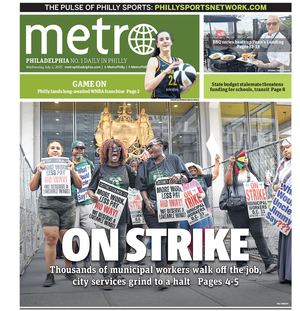Mayor Michael Nutter signed an executive order Thursday establishing an Open Data Policy for the city that mandates all executive branches to release information through a centralized Open Data Portal accessible to the public online.
“We want Philadelphia to be as transparent and accessible as possible,” Nutter said. “The Open Data Policy will make the release of information from departments to the public predictable and timely.”
Open data is based on a premise that free, accessible information makes for a more transparent, accountable government, an engaged citizenry and a knowledge base from which individuals can build new ideas. “There’s a hunger for knowledge and information and it’s based on data
we’ve held captive in our system,” Chief Technology Officer Adel Ebeid
said.
The portal will include a mechanism for public assessment and feedback. “As we know, Philadelphians are never shy about offering comments, critiques and suggestions,” Nutter said.
But it won’t be available immediately: an informal working group comprised mainly of city employees has been meeting since late December to navigate the intricacies of sensitive information that is subject to client privilege, state or federal rules and to decide what data sets to make public.
“As much as we want to rush out and publish as much data as possible, we need to make sure it’s structured and achievable,” Ebeid said, acknowledging the work done by past public-private open data partnerships, such as Code for America fellows. “What this does is leverage the success of those agencies and takes their work to the next step. … To expand what we’ve done, we need to put a governance in place.”
“The reason for the working group and advisory board is to decide what are high value data sets that need to be out in the public,” he continued. “We don’t want to confuse people and we want to publish accurate data.” He said the team aims to get the portal up and running within six months.
The city’s Office of Innovation and Technology already partnered with software firm Azavea’s Open Data Philly – founded during last year’s Tech Week – which provides over 100 municipal and non-municipal data sets. The city may use the portal as its platform of choice, but has not yet decided.
“We are a tech town and our reputation is growing,” Nutter said. “This Open Data Policy will push the city to the next level.”
In addition to the portal itself, the executive order creates:
– A Chief Data Officer to oversee and enforce the policy.
– An Open Data Working Group to develop the portal’s practical details, including what information should be released
– A Data Governance Advisory Board consisting of nine mayoral appointees from the public, private, academic and nonprofit sectors that will oversee the policy’s ongoing implementation.
– A social media policy for city employees that work in the executive branch. “Social media is an incredible tool or mechanism, but it has limits – or needs to have them,” Nutter said. “Municipal employees serve the public but have private lives. We need to make sure there’s not too much bleeding back and forth between those two areas.”































